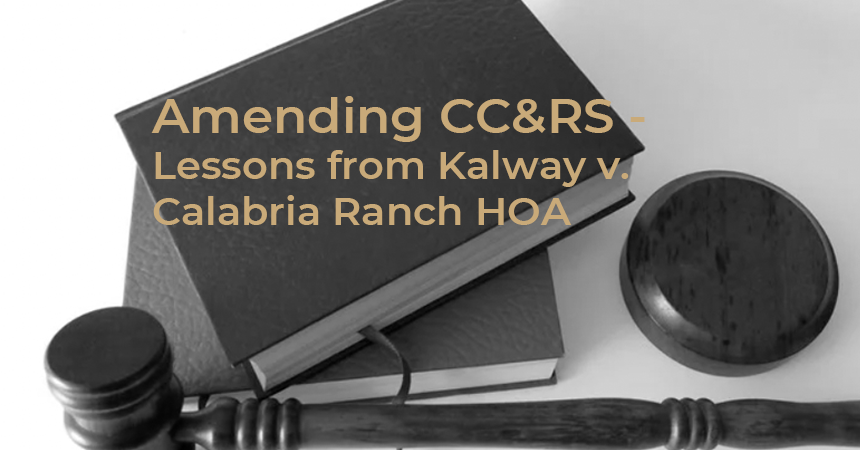By Chandler W. Travis, Esq.
On March 22, 2022, the Arizona Supreme Court issued a decision in the case of Maarten Kalway v. Calabria Ranch HOA, LLC et al., which addresses the ability of community association members to amend an association’s recorded declaration of covenants, conditions and restrictions (“CC&Rs”).
Calabria Ranch Estates is a five lot residential subdivision outside of Tucson, and each lot is subject to the original declaration recorded in 2015. The original declaration stated that the CC&Rs could be amended “at any time by an instrument executed and acknowledged by the [m]ajority [v]ote of the owners.” In 2018, the other lot owners amended the original CC&Rs by a majority vote without Kalway’s consent or knowledge. These amendments to the original CC&Rs revised some definitions, added new definitions, created new restrictions and enacted new enforcement measures against owners for violating the covenants. These amendments seemingly disproportionately affected Kalway and his lot, which is almost 23 acres, while the other four lots are 3.3 to 6.6 acres.
Kalway sued the Calabria Ranch HOA and the other four lot owners, seeking a declaratory judgment to invalidate the amendments to the CC&Rs. After the parties submitted cross-motions for summary judgment, the superior court invalidated some of the amendments entirely, and some partially. Kalway appealed this decision, arguing that all the CC&R amendments were invalid because they were not approved with unanimous consent. The Court of Appeals rejected Kalway’s appeal. The Arizona Supreme Court noted that it granted review “because the petition raises issues of statewide importance within the scope of an HOA’s authority to amend CC&Rs.”
Now, for the lessons from this case. First, the Supreme Court noted that Arizona courts have the authority to “blue pencil” CC&Rs to eliminate “grammatically severable, unreasonable provisions.” Thus, an Arizona court can strike language from amended CC&Rs, where the court determines the amendment is invalid.
Second, the Supreme Court stated that: “[T]he original declaration must give sufficient notice of the possibility of a future amendment; that is, amendments must be reasonable and foreseeable.” In utilizing the analysis that the Court of Appeals previously set forth in the case of Dreamland Villa Community Club, Inc. v. Raimey, 224 Ariz.42, 51 (App. 2010), the Supreme Court held that an association “cannot create new affirmative obligations where the original declaration did not provide notice to the homeowners that they might be subject to such obligations.” Thus, the Arizona courts and associations considering amendments to a declaration must look to the original declaration to determine whether it gave “sufficient notice of a future amendment.” The Supreme Court stated this would be an objective inquiry of the original declaration. This notice provision in the original declaration must alert an owner to the fact the CC&Rs “can be amended to refine it, correct the error, fill in the gap, or change it in a particular way.” Citing an Illinois case, the Supreme Court noted that “future amendments cannot be ‘entirely new and different in character,’ untethered to an original covenant.” Such a CC&R amendment would exceed an owner’s expectation of the scope of the CC&Rs.
For board directors and association counsel considering a CC&R amendment, the Supreme Court’s decision puts all “on notice” that an Arizona court has the authority to strike words, sentences or entire amendments, IF the amendment language creates covenants or restrictions that exceed the notice set forth in the original declaration based on an owner’s reasonable expectations at his/her time of purchase.
The Kalway decision will likely result in more owners filing suit against community Association in connection to CC&R amendments, asserting the argument that the owner did not expect the association to adopt such an amendment when he/she purchased a lot or unit within the association.
The information provided herein is for reference purposes only, is general in nature, and is not intended as legal advice. For specific questions or legal issues regarding your association, please contact us at 480-219-3633.

